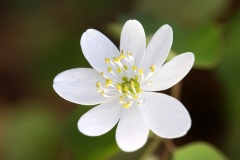Anemone
| Infobox on Anemone | |
|---|---|
| Example of Anemone |  |
| Facts | |
| Origin | - |
| Stowage factor (in m3/t) | - |
| Humidity / moisture | - |
| Ventilation | - |
| Risk factors | - |
Anemone
Contents
Description
Scientific name and introduction
Anemone spp. Brightly coloured in deep reds, blues, purples, and white, anemones have rather short terms, and are typically a Spring flower. New, improved tertaploid varieties have recently been introduced into commerce. Anemone is an ancient Greek name meaning windflower from ‘anemos’ for wind.
Quality characteristics and criteria
Flowers should be harvested when the buds are fully coloured and 25% to 50% open, but before the petals have expanded and the pollen is shed.
Grading and bunching
Anemones are normally sold in bunches of 10 stems.
Ethylene sensitivity
Ethylene exposure causes petal shatter and reduced vase-life.
Pretreatments:
Pretreatment with STS or MCP prevents the deleterious effects of ethylene.
Storage conditions Anemones should be stored at 0° to 1°C, and may be dry-stored for at least 1 week. Store in a vertical position.
Packing
The flowers are usually packed in standard horizontal fibreboard boxes.
Special considerations
Anemone’s prominence and beauty in arrangements is a double-edged sword because of the flower’s relatively short vase-life. It is preferable not to use anemones as focal points. Keep stems wrapped during re-hydration to help keep them straight. There is no scientific basis for the practice of piercing a hole through the flower base to extent life. Placing anemones in vases with freshly cut daffodils can reduce their life because of the harmful juices exuded from the daffodils.











